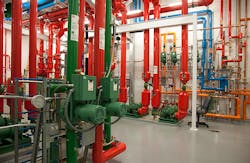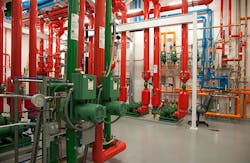DOE proposal puts pump efficiency standards in motion
CHICAGO — The highly anticipated, yet still a bit nebulous, pump efficiency standards are now becoming a reality as the Department of Energy (DOE) formally introduced the first-ever standards for commercial and industrial pumps.
The proposed standards, which would cover clean water pumps — ranging from 1 to 200 horsepower in size — generally used in commercial, industrial, agricultural, and municipal applications, are projected to produce up to $1.1 billion in net energy bill savings from pumps sold in the next 30 years.
Commercial and industrial pumps and pump systems are responsible for about 0.6 percent of U.S. annual energy use.
“While this number may sound small, it is significant for a single product category and therefore, improvements in pump efficiency offer potentially large energy savings,” said Meg Waltner, manager, building energy policy at National Resources Defense Council (NRDC).
Final ruling is anticipated by the end of this year. Pump manufacturers would likely have four years from the publication of the final rule to comply with the new standards.
Manufacturer involvement
“The DOE is well beyond proposing standards — this is going to happen,” said Mark Chaffee, vice president, Taco, Inc. “As the efficiency standards become fully revealed, we expect to be comfortably on the front end of the industry. We’ve been involved with the preparations from the outset as we figured it wasn’t a matter of if our industry was going to be regulated but rather when.”
“We have been engaged in discussions with the DOE since the very start of the rulemaking process in 2011,” continued Chaffee. “Led by the Hydraulic Institute, we are one of 19 key members on a working group composed to engage with DOE’s Appliance Standards Advisory Committee (ASRAC). This group has reached a consensus on the scope of the rulemaking and the proposed energy conservation measures.”
According to Mark Handzel, vice president, product regulatory affairs, and director, HVAC commercial buildings, Bell & Gossett, a Xylem Brand, the new regulations will phase out the least efficient pumps in the U.S. market in favor of pumps that meet minimum efficiency standards modeled after regulations already in place in the European Union.
The Hydraulic Institute, which represents more than 450 U.S. pump manufacturers, including Xylem, supports following the 2009 EU guidelines. The U.S. pump industry has been largely unregulated since the enactment of the Energy Policy and Conservation Act of 1975, which mainly targeted pump motors. The DOE proposal includes only pumps designated for use in pumping clean water.
The good news for pump manufacturers is that the government rulemaking process is following a negotiated rulemaking model, which means that the vested interests of the pump industry are given key consideration in shaping the new legislation.
The DOE ASRAC Commercial and Industrial Pumps Working Group, of which Xylem is a part, is comprised of manufacturers, trade association members, customers, motor manufacturers and efficiency advocates. The Pumps Working Group presented the DOE ASRAC Committee with 14 recommendations, including the development of test procedures, labels and energy conservation.
“While the changes won’t be without financial impact on pump manufacturers, the industry as a whole will benefit from the revisions,” said Handzel.
First, it levels the playing field in the global marketplace. Without wholesale modernization of the industry, U.S. companies are in danger of losing their competitive advantage around the world.
Plus, any pump manufacturers currently operating in Europe must already comply with their more stringent standards, so the new U.S. regulations can help streamline operations for U.S. manufacturers.
Second, the regulations could spur new product development and promote U.S. products overseas. It’s an opportunity for U.S. companies to capitalize on technological advances to produce a better product.
“Ultimately, we knew that we were going to have to be compliant with whatever the DOE decided, so we preferred to be part of the process,” said Chaffee. “After all, we can’t argue the fact that improving the energy efficiency of buildings is good for the environment, and improves our nation’s energy sustainability overall.”
These concerns are etched pretty deeply at Taco. In fact, leading by example, Taco’s own buildings showcase advanced hydronic and pumping efficiency, evident in Taco’s Innovation and Development Training Center which is LEED Gold certified.
According to Waltner, overall, the proposed standards will save about 30 billion kilowatt-hours from pumps sold over the next 30 years, equivalent to the annual electricity use of 2.8 million U.S. households, and result in 16 million metric tons of carbon pollution emissions reductions. For most pump types, life cycle cost savings range from $92 to $173 per pump, with simple paybacks under three years.
Contractor impact
Contractors will specify, select and install the pumps in the same manner as today, though operational efficiencies will improve, and the cost for the technology will inevitably increase.
It’s clear that installers will not be able to buy some pumps in the future, as a percentage of the least efficient pumps in the market will be banned from being sold. The style of pump — in-line, vertical, split case, etc. — may remain on the market, though they’ll be changed in some way to make them more energy efficient.
“There will also be a lot more comparative data available to evaluate different pumps, which should help the contractor make better decisions,” said Chaffee.

